Facts about Wrestling

In ancient Greece, wrestling occupied a prominent place in legend and literature; wrestling competition, brutal in many aspects, was the supreme contest of the Olympic Games.

Beach wrestling is standing wrestling done by wrestlers, male or female, inside a sand-filled circle measuring 6 meters in diameter.
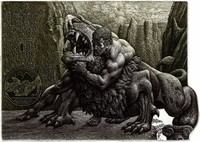
Greek mythology celebrates the rise of Zeus as ruler of the earth after a wrestling match with his father, Kronos.

Wrestling is described in the earliest celebrated works of Greek literature, the Iliad and the Odyssey.

Wrestling is the act of physical engagement between two unarmed persons, in which each wrestler strives to get an advantage over his opponent.

In 1520, at the Field of the Cloth of Gold pageant, Francis I of France threw Henry VIII of England in a wrestling match.

The Epic of Gilgamesh in Sumerian literature features its hero Gilgamesh establishing his credibility as a leader after wrestling Enkidu.

Apparently in a bid to give wrestling greater appeal to television audiences, FILA adopted beach wrestling as an official discipline during 2004-2005.
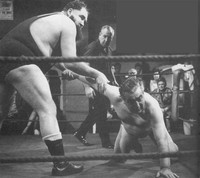
The term wrestling is an Old English word that originated some time before 1100 C.E.

The following list provides examples of wrestling systems that fall into this category.

Wrestling made a name for itself while history was still young in Ancient Egypt, Ancient Greece, and several smaller countries.

By the eighth century, the Byzantine emperor Basil I, according to court historians, won in wrestling against a boastful wrestler from Bulgaria.

After not being featured in the 1900 Olympics, sport wrestling was seen again in 1904 in St. Louis; this time in freestyle competition.

Many other prominent and successful fighters began their training in various forms of wrestling, and fighters from non-wrestling backgrounds often pursue wrestling training to complement their other skills.

On the 406 wrestling pairs found in the Middle Kingdom tombs at Beni Hasan in the Nile valley, nearly all of the techniques seen in modern freestyle wrestling could be found.

Collegiate wrestling (sometimes known as scholastic wrestling or folkstyle wrestling) is the commonly used name of wrestling practiced at the university level in the United States.

The first documented evidence of wrestling in Egypt appeared circa 2300 B.C.E., on the tomb of the Old Kingdom philosopher Ptahhotep.

During the Middle Ages, wrestling remained popular and enjoyed the patronage of many royal houses, including those of France, Japan, and England.

The main professional wrestling league is the World Wrestling Entertainment (WWE), formerly known as the World Wrestling Federation (WWF).

The term is used to distinguish the styles of wrestling used in other parts of the world, and for those of the Olympic Games: Greco-Roman wrestling and Freestyle wrestling.
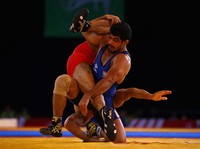
Physical techniques which embody the style of wrestling are clinching, holding, locking, and leverage.

description of wrestling appears in the Old Testament book of Genesis 32:22-32.

The Merriam-Webster online dictionary defines wrestling as "a sport or contest in which two unarmed individuals struggle hand-to-hand with each attempting to subdue or unbalance the other.

Many styles of wrestling are known all over the world and have long histories, and sport wrestling (particularly amateur wrestling) has become an Olympic sport.

Wrestling disciplines defined by FILA are broken down into two categories: International wrestling disciplines and folk wrestling disciplines.

Both Herakles and Theseus were famous for their wrestling against man and beast.

Roget's New Millennium Thesaurus does not support the usage of "wrestling" (noun) and "grappling" (noun) as synonymous.

Wrestling has gained respect among martial arts practitioners, especially with the advent of mixed martial arts competition.

Other cultures featured wrestling at royal or religious celebrations, but the ancient Greeks structured their style of wrestling as part of a tournament where a single winner emerged from a pool of competitors.

Late Greek tradition also stated that Plato was known for wrestling in the Isthmian games.

According to the International Federation of Associated Wrestling Styles, there are five current international wrestling disciplines acknowledged throughout the world.

The passage depicts the patriarch Jacob wrestling with the Angel, for which Jacob was subsequently renamed Israel.

The French developed the modern Greco-Roman style which was finalized by the nineteenth century and by then, wrestling was featured in many fairs and festivals.
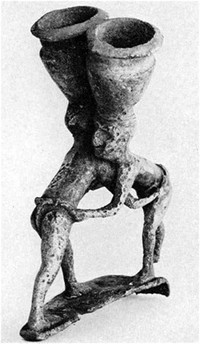
Other sculptures and literature from ancient Mesopotamia show that wrestling was held in popularity.
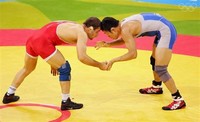
When the Olympic games resurfaced at Athens in 1896, Greco-Roman wrestling was introduced for the first time.

Professional wrestling most closely resembles a soap opera, with well-defined characters that play to the audiences' emotions.

Avoiding potentially lethal techniques, wrestling has aspects of ritual fighting, but its basic principles are closely related to those of military hand-to-hand combat or self-defense systems.





